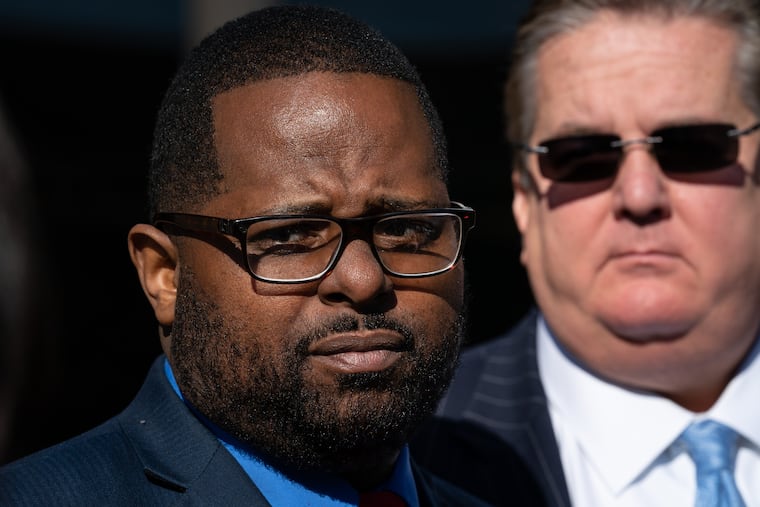Ex-Traffic Court judge who lied to FBI gets same sentence at federal court hearing
Willie Singletary, who was convicted of lying to the FBI, is now seeking an at-large Philadelphia City Council seat.

A day after he filed petitions to run for an at-large seat on Philadelphia City Council, former Traffic Court Judge Willie Singletary went to federal court Wednesday seeking to get an already-served prison term reduced.
Singletary, 38, had been sentenced in March 2015 by U.S. District Judge Lawrence F. Stengel to 20 months in prison, followed by a year of supervised release, after a jury in 2014 convicted him of lying to the FBI during an investigation of rampant ticket-fixing in Traffic Court. The U.S. Court of Appeals for the Third Circuit last year ordered a resentencing hearing because an erroneous guideline range had been applied.
But on Wednesday, U.S. District Judge Robert F. Kelly resentenced Singletary to the same 20-month term. Kelly acknowledged that the advisory guideline range for Singletary should have been zero to six months in prison, but accepted the government’s recommendation to go above those guidelines. Among the reasons for doing so, Kelly said, was to avoid sentencing disparities among other defendants in the ticket-fixing scandal and to make the sentence be seen as a deterrent to others.
“This entire incident was so pervasive, so destructive, to an arm of Philadelphia government that it was wiped out, disintegrated,” Kelly said, referring to Traffic Court’s being abolished in 2013 and its duties folded into the newly created Traffic Division of Municipal Court.
Singletary said after the hearing that he had served a year behind bars and six months in a halfway house, and now runs a limousine company and serves as a pastor at a West Philadelphia Baptist church. His attorney, William J. Brennan, said Singletary had gotten two months’ credit for good behavior.
Brennan told the judge that even before the March 2015 sentencing, he had realized that the applicable guideline range for Singletary was zero to six months behind bars, but said a chief supervisor in the U.S. Probation Office used a higher guideline range of 15 to 21 months. Brennan added that he had tried to argue the matter with Stengel, but Stengel “did not see it my way.”
Brennan said that although Singletary already had served his sentence, they were in court so “that this wrong [could] be righted."
After Singletary’s appeal, the government agreed that the higher guideline range that was used was wrong. Nonetheless, Assistant U.S. Attorneys Denise Wolf, chief of the Criminal Division, and Anthony Wzorek both argued that Singletary deserved the original 20-month sentence.
In a resentencing memorandum filed this month, Wolf wrote that although Singletary and other Traffic Court judges were acquitted by the jury on conspiracy and fraud charges, witness testimony at the two-month trial established that Singletary “participated in this riot of ticket-fixing.” She also noted that Stengel, after speaking to jurors, had indicated that jurors believed the Traffic Court judges fixed tickets and that the system was corrupt, but that it was difficult for the government to prove all the elements of mail and wire fraud.
Other Traffic Court judges who were convicted by the jury of perjury, or lying to a grand jury, received sentences similar to Singletary’s, Wolf wrote. Former Traffic Court Judge Thomasine Tynes was sentenced to 24 months in prison; Michael Lowry to 20 months in prison; and Robert Mulgrew to 18 months in prison. (Stengel ordered that Mulgrew’s sentence be consecutive to a 2½-year sentence he already was serving in an unrelated case, in which he pleaded guilty to fraudulently using about $200,000 in state grant money given to a South Philly nonprofit he had helped run.)
Brennan argued before Kelly that lying under oath to a grand jury, as the other convicted Traffic Court judges had done, was different from lying to the FBI.
Before he was resentenced, Singletary told the judge that he accepts responsibility for his crimes. “I have made corrections to my lifestyle,” he said.
Kelly said that Singletary is a divorced father of two children and “remains active in their lives.”
In imposing his sentence, Kelly said of Singletary: “I doubt he will, but we never know ... find himself in a position of power again.”
It was not clear if Kelly knew that Singletary is running for City Council. It was not mentioned during the court hearing.
The Pennsylvania Constitution bars people “convicted of embezzlement of public moneys, bribery, perjury, or other infamous crime” from holding “any office of trust or profit” in the state. Singletary has said his felony conviction does not bar him from holding a city office.
He told reporters after the hearing: “Yes, I made a mistake. But I’m not a mistake.
“I think what I went through made me a better person,” he said, adding that it would be up to city residents whether to vote for him in the May 21 primary.